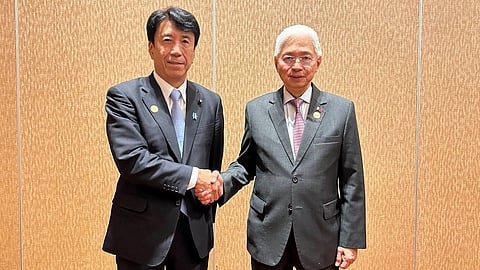
- NEWS
- the EDIT
- COMMENTARY
- BUSINESS
- LIFE
- SHOW
- ACTION
- GLOBAL GOALS
- SNAPS
- DYARYO TIRADA
- MORE

The Japanese government, through the Japan Bank for International Cooperation (JBIC), indicated its interest in the development of a waste-to-energy project that would contribute to the Philippines’ efforts towards a clean energy transition.
The proposed cooperation was the outcome of a meeting between Trade and Industry Secretary Fred Pascual and his counterpart, Minister Saito Ken of Japan, on the sidelines of the Indo-Pacific Economic Framework for Prosperity Ministerial Meeting last 6 June.
Pascual and Minister Ken discussed potential areas of cooperation, particularly in clean energy, trade and investment.
“Building on the successful trilateral meeting between the United States, Japan, and the Philippines, we are eyeing more opportunities to strengthen our existing bilateral trade and economic partnership with Japan,” Pascual said.
Both officials also welcomed opportunities for a green transition, which includes the waste-to-energy project JBIC wanted to get into.
Building on the successful trilateral meeting between the United States, Japan, and the Philippines, we are eyeing more opportunities to strengthen our existing bilateral trade and economic partnership with Japan.
The JBIC, originally established as the Export Bank of Japan in 1950, is a policy-based financial institution wholly owned by the Japanese government that conducts lending, investment, and guarantee operations with a mission of contributing to the sound development of Japan and the international economy and society.
An example of a waste-to-energy project that is currently in the works is the Quezon Waste-to-Energy Plant, a 42-megawatt (MW) biopower project planned in the National Capital Region, currently at the permitting stage.
The project, being developed by Covanta Holding, Macquarie Group, and Metro Pacific Investments, is expected to supply enough clean energy to power 60,000 households.
Investment potential abounds
For his part, Pascual recognized the successful Philippine Freeports and Economic Zones Roadshow in Osaka, which showcased the Philippines’ investment potential to Japanese businesses in sectors such as manufacturing, logistics, energy and agriculture.
Highlighting the outcomes of the Trilateral Ministerial Meeting with the US and Japan, the DTI chief expressed openness to the OPEN Ran initiative of Japan, which presents their plans to strengthen digital capacities and establish an ORAN academy in the country.
Under the Partnership for Global Infrastructure and Investment investment accelerator, Japan also reaffirmed its support for the development of the Luzon Economic Corridor, which is expected to boost growth in key industries such as electronics, semiconductors and clean energy.
Further, both countries also discussed the potential for collaboration in the critical minerals sector, particularly in developing resilient and reliable global supply chains.
The Philippines expressed its strong interest in joining the Critical Minerals Agreement, which would further strengthen cooperation in this area.
The Philippines also pushed for the resumption of the General Review of the Philippines-Japan Economic Partnership Agreement, emphasizing that the agreement aims to expand economic ties beyond trade in goods, covering areas like services trade, digital economy and sustainability.
